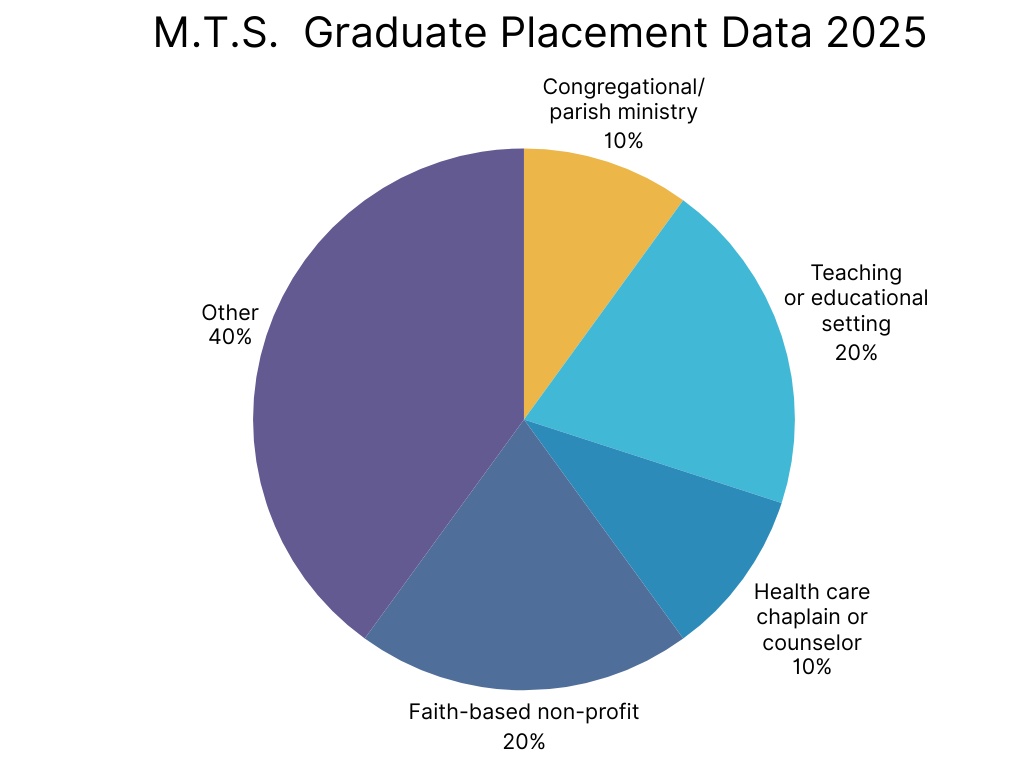What is Theological Studies at Vanderbilt?
The Master of Theological Studies (M.T.S.) at Vanderbilt Divinity School is a 48-credit graduate theology degree that offers academic depth, interdisciplinary flexibility, and space for personal spiritual growth. This program is ideal for students interested in non-ordained ministry, religious leadership, social justice work, or future doctoral study in religion.
The curriculum includes foundational coursework in biblical studies, ethics, theology, and religious history—paired with electives and concentration options tailored to each student’s vocational goals. Students also have the opportunity to take graduate-level courses across Vanderbilt University, making this a flexible academic pathway among graduate theology degrees.
Rooted in our values of radical hospitality, innovation within a university setting, and commitment to the common good, the M.T.S. welcomes students from all backgrounds and spiritual traditions. Whether you are exploring faith, preparing to serve, or seeking to engage contemporary ethical challenges, this degree helps you grow—and equips you to make an impact.
Master of Theological Studies Tracks and Curriculum
The M.T.S. program has two curricular tracks to choose from:
- A general plan of study, featuring a core foundation in theological studies (21 hours), a wide range of elective options (27 hours), and an M.T.S. project/thesis or portfolio
- A concentration plan of study, consisting of 9 hours of core courses, one or more concentrations designed to prepare students for particular vocational paths (9-18 hours), a wide range of elective options (12-24 hours), and an M.T.S. project or thesis (3 hours)
Additional M.T.S. Program Information
Students in either the M.Div. or the M.T.S. may take graduate-level course work in other Vanderbilt University departments and may count these hours toward requirements for graduation. Such outside coursework is subject to the rules that apply to transfer work.
Some students may enter upon their theological studies with previous work in one or more required curriculum subjects. Students may opt to waive individual courses, provided they have taken comparable coursework in the area at the undergraduate level. They may opt to transfer classes (up to 12 hours), provided they have taken them at the graduate level at a school accredited by the Commission on Accrediting of the Association of Theological Schools. The Associate Dean of Academic Affairs must approve waivers and transfer work. If a waiver is granted, another course in the same subject area must be taken. Students should consult with their advisors about the matter.
This openness to interdisciplinary learning and flexibility is one way we present ourselves as an integral part of Vanderbilt University—fostering innovation, ethical engagement, and cross-campus collaboration.
Master of Theological Studies Outcomes
-
95%
of our graduates are in a vocational placement within a year.
Whether pursuing doctoral studies in religion, diaconal ministry, church leadership, or religious leadership in the nonprofit sector, our alumni contribute meaningfully to their communities. You can’t go far in Nashville—or the broader region—without encountering someone shaped by the Vanderbilt Divinity School.

M.T.S. Degree Eligibility
Applicants to the MTS and MDiv degree programs must hold a baccalaureate degree from an accredited college or university. We strongly recommend an average GPA of 2.9 or higher. If you do not hold an undergraduate degree or have a degree from an unaccredited institution, but otherwise show experience and promise for graduate theological education, you may still be eligible.
We welcome learners of all backgrounds and traditions, and believe that preparation for ministry should be rooted in radical hospitality, spiritual formation, and a commitment to the common good. If you’re discerning a call to serve, lead, or accompany others through faith, we invite you to take the first step.